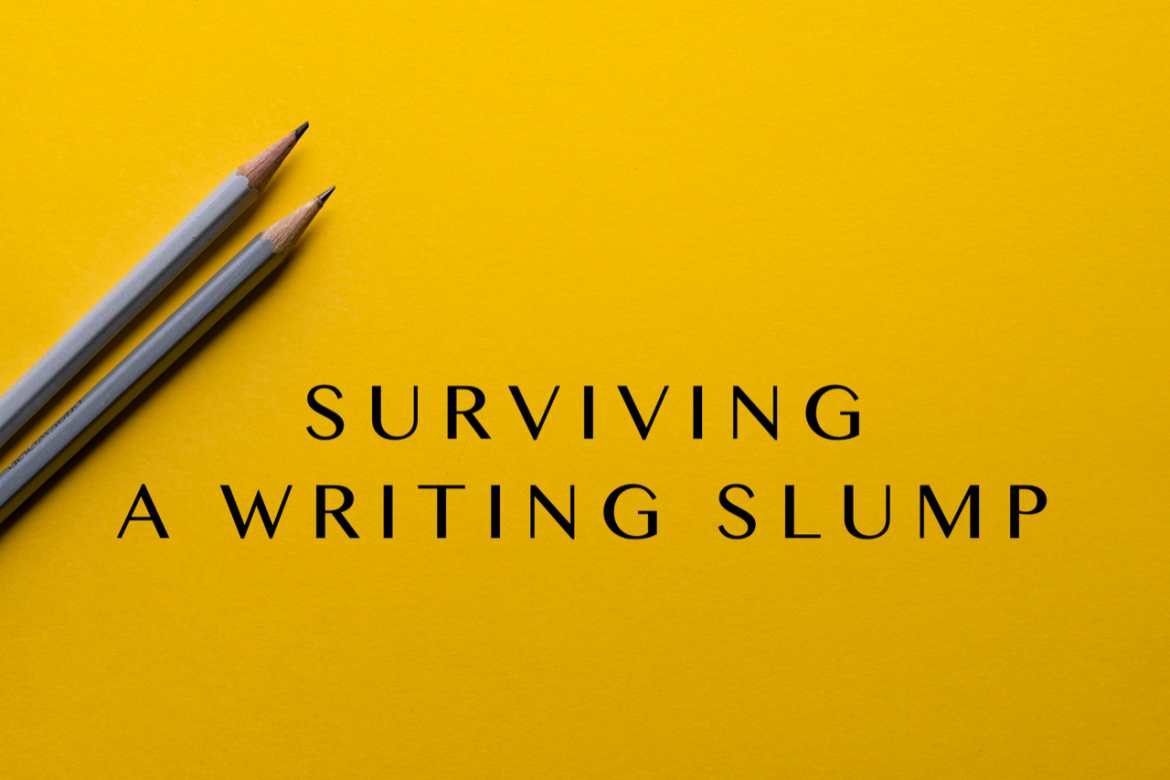Surviving a Writing Slump
So, you’ve been staring at a notebook or computer screen, waiting for divine writing inspiration to strike. You’ve tried to think of something, anything, to put down on paper, but it all seems wrong. You’re in a writing slump. Luckily for you, you’re not alone. Many writers go through the exact same experience, and we’re here to give you a couple tips that could help you out.
Write, Write, Write
As you’ve probably heard before, writing is a process—a messy one. The first step? “Fart it out,” as one of our authors, Caley Cantrell, would say. Seriously though, to get out of a slump, just start writing. Put anything on the page. Make yourself do a ten-minute free write, and don’t let yourself stop to think or edit.
Betty Flowers, a professor at University of Texas, says that to start writing, you need to let loose your “madman.” Your madman is the creative voice in your head that is full of passionate, fun ideas that are the heart and soul of your work. If allowed, your madman could let you go on for pages and pages on the same topic without any judgement or restraint. As a result, your work may seem a bit messy to begin with, but that's okay. When you let your madman take center stage, your own unique voice is able to finally emerge through your writing. So, worry about structure or cleaning up your masterpiece later. The key here is to let out all of your built-up creativity without tearing yourself down or calling your work “not good enough.”
Of course, not all of the content your madman creates will end up in your final draft. However, writing with your madman in mind allows you to start somewhere by finally getting your thoughts down on paper and bringing life and playfulness back into your work. And hey, you might just end up surprising yourself. So, let your inner creativity loose and come back to patch up your work later!
Write Writing Into Your Schedule
If you’re in a writing slump, chances are you’ve consistently pushed off working on your latest project. While you make promises to yourself that you’ll work on it tomorrow or sometime in the near future, you find other things to consume your time to avoid feelings of frustration regarding your craft. It’s okay, we’ve been there too.
With a mentality like this, we recommend that you start scheduling writing sessions into your everyday routine. Of course, setting aside large portions of time each day for writing isn’t always realistic on a day-to-day basis, however even on the busiest days, writing for an hour or two can make a big difference. Scheduling time for your craft will not only make you feel obligated to sit down and write, but it will give your latest project the time and attention it deserves.
Phone a Friend
When writing, you’re often flying solo. Because of this, being a writer can seem like one of the loneliest jobs out there. Though there are benefits to being your own boss, sometimes it may be hard to find the motivation to sit down and write. With this in mind, we recommend that you find someone to talk to about your craft. Discussing your work with a trusted friend or community member can give you helpful feedback, inspire you with new ideas, and give you the encouragement you need to keep writing. You could even go a step further by setting deadlines with them—send them a couple of chapters a week, or more! This will not only provide you with consistent, constructive feedback on your latest novel, but it will also help compel you to stick to your writing schedule.
Discussing your work with someone can also allow you an outlet to express any concerns, frustrations, or anxieties that have prevented you from feeling enthusiastic about writing. Finding the root cause of your lack of motivation can hopefully prevent it from happening in the future and allow you to easily jump over any mental hurdles in your way.
Do Your Research
If you find yourself scratching your head and coming up blank on who to send your work to, don’t fret. There are helpful resources online and in your local community that can also motivate you on your writing journey. For example, try enrolling in a writing class. If you’re currently in high school or college, fill one of your elective slots with a writing course the next time you’re able to sign up for classes. If you’re not a student, a quick Google search can show you community centers, or writing centers, near you that provide helpful writing courses, tutors, or workshops you can use to your benefit. By researching the resources in your local community, you can still have that one-on-one experience to discuss your craft.
If you don’t have the means to enroll in a class, try joining an online community for some writing inspiration, such as The Isolation Journals created and hosted by Suleika Jaouad. By signing up with your email, you’ll receive a fresh writing prompt in your inbox every morning. Online resources like this exercise your imagination and allow you to free write to your heart's content. Who knows, maybe one day one of these prompts will surprise you and end up contributing to the latest novel you’re writing. For other online writing resources, check out this article by NY Book Editors titled “11 Top Writing Communities You Should Join and Why.”
Don’t Mentally Beat Yourself Down
This one is perhaps the most important tip of all. We know that writing is a very personal and emotional experience. Your work is your baby, and because of this, you want it to be perfect. However, remember that you also need to take care of yourself and your mental health. Even if you’re unable to produce much during your scheduled writing time, that’s okay. Walk away from your work and try to come back to it tomorrow after a little TLC.
Who knows? Instead of your writing desk, you may actually find the divine inspiration you seek in the most random of places. Because of this, always keep a notebook handy for when your brain randomly gifts you good ideas. (Did you know that waterproof notepads actually exist for your shower thoughts? Something to think about…)
All jokes aside, it’s good to be critical of your work, but don’t become your own worst enemy. Remember that consistently associating your craft with negative feelings and emotions is not good for you or your work. Too much stress could possibly cause your passion for writing to slowly slip away from you, and we don’t want that to happen!





